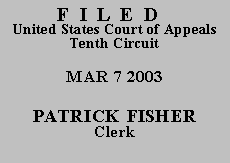

| UNITED STATES OF AMERICA, |
and 96-CR-203-S ) |
Following a jury trial,(1) Mr. Bernhardt was convicted of conspiracy to possess with intent to distribute methamphetamine, in violation of 21 U.S.C. §§ 841(a)(1) & (b)(1)(A), 846 (count 1); possession and the attempted possession with intent to distribute a controlled substance, and aiding and abetting, in violation of 21 U.S.C. § 841(a)(1) & (b)(1)(A), 18 U.S.C. § 2 (counts 2 and 9); and using or carrying a firearm in connection with a drug trafficking offense, in violation of 21 U.S.C. § 841(a)(1), 18 U.S.C. § 924(c) (counts 3 and 10).
We affirmed Mr. Bernhardt's conviction on direct appeal. United States v. Bernhardt, 198 F.3d 259 (10th Cir. 1999). He now seeks a certificate of appealability (COA) to pursue his appeal of the district court's denial of his petition for a writ of habeas corpus filed pursuant to 28 U.S.C. § 2255. Determining that Mr. Bernhardt has not met the statutory requirements, we deny his application and dismiss the appeal.
To be entitled to a COA, Petitioner must make "a substantial showing of the denial of a constitutional right." 28 U.S.C. § 2253(c)(2). He can make this showing by establishing that "reasonable jurists could debate whether (or, for that matter, agree that) the petition should have been resolved in a different manner or that the issues presented were adequate to deserve encouragement to proceed further." Slack v. McDaniel, 529 U.S. 473, 484 (2000) (quotation omitted).
Mr. Bernhardt raises two arguments(2) in his COA brief: (1) the indictment violated the Double Jeopardy Clause of the Fifth Amendment; and (2) Bernhardt's trial counsel was ineffective in violation of his Sixth Amendment rights. We consider each contention in turn.
Mr. Bernhardt failed to raise his double jeopardy claims on direct review. When considering a habeas petition, we are barred from considering claims that were not raised on direct appeal, absent a showing of cause and prejudice, or a miscarriage of justice. United States v. Allen, 16 F.3d 377, 378 (10th Cir. 1994). Because Mr. Bernhardt has failed to make such a showing, his claims are procedurally barred. Further, in reviewing Mr. Bernhardt's argument, we find no merit to his claim of a double jeopardy violation.
We also conclude that Mr. Bernhardt did not receive ineffective assistance of counsel for substantially the reasons set forth by the district court. Mr. Bernhardt failed to make the requisite showing of "prejudice," as required by Strickland v. Washington, 466 U.S. 668, 687 (1984).
The application for a certificate of appealability is therefore DENIED.
ENTERED FOR THE COURT,
Deanell Reece Tacha
Chief Circuit Judge
*.This order and judgment is not binding precedent, except under the doctrines of law of the case, res judicata, and collateral estoppel. This court generally disfavors the citation of orders and judgments; nevertheless, an order and judgment may be cited under the terms and conditions of 10th Cir. R. 36.3.
1. In his brief, Mr. Bernhardt adopts the facts as set forth in our direct review of his appeal, United States v. Bernhardt, 198 F.3d 259 (10th Cir. 1999). We do the same.
2. Mr. Bernhardt raised a third argument in his Notice of Appeal in the district court, under Apprendi v. New Jersey, 530 U.S. 466 (2000). Although his COA brief in this court does not mention his Apprendi argument, the district court properly noted that Apprendi claims may not be considered on collateral view. United States v. Mora, 293 F.3d 1213, 1219 (10th Cir. 2002) ("Apprendi is not a watershed decision and hence is not retroactively applicable to initial habeas petitions.").